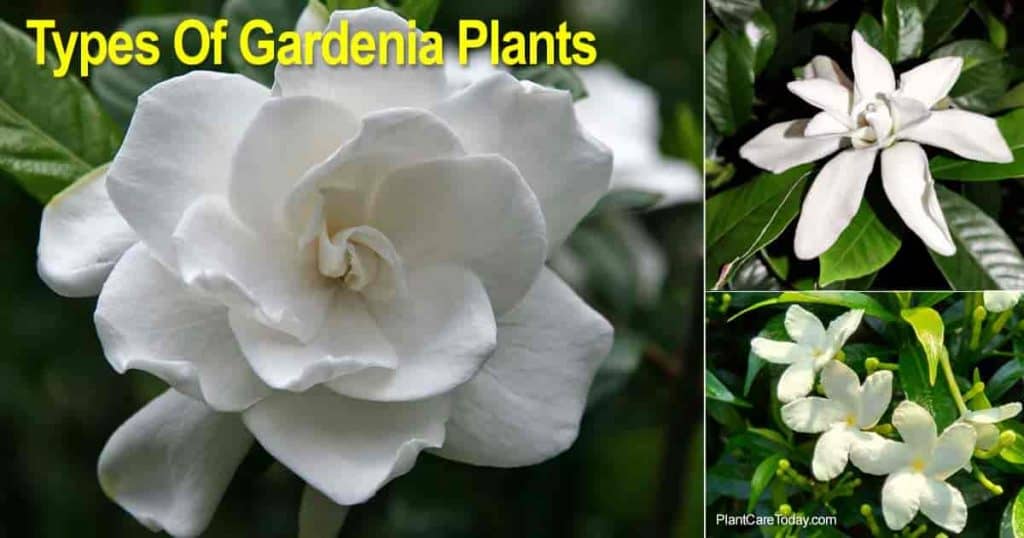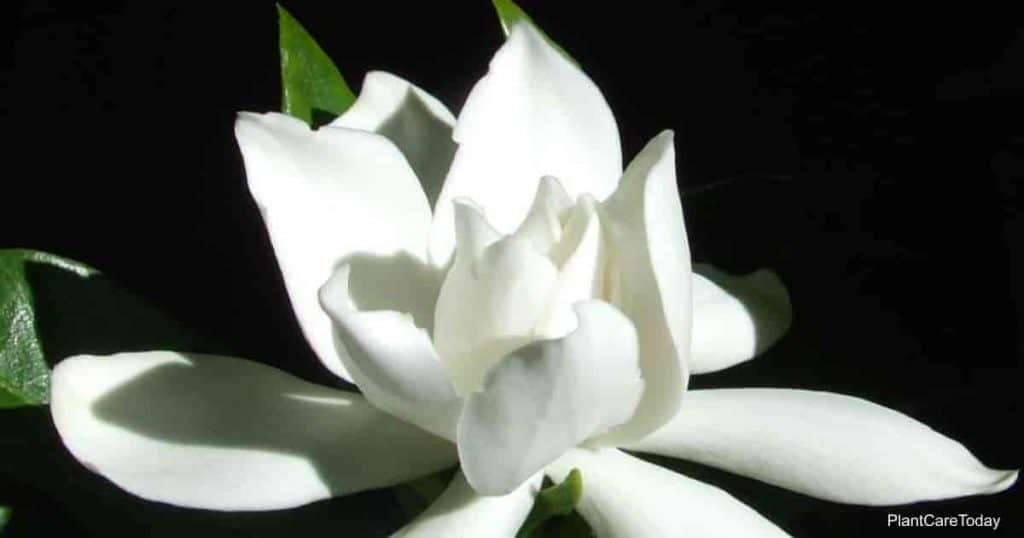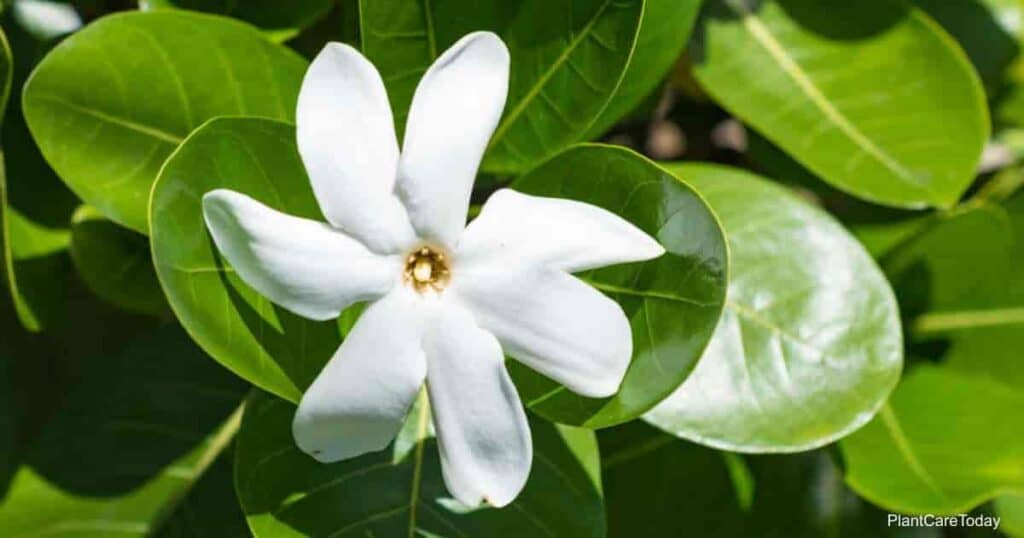Gardenia trees and shrubs are members of the Rubiaceae or madder family. The plant hails from China, the Pacific Islands, and Africa.
The name honors Dr. Alexander Garden, an 18th-century Scottish zoologist, and botanist who lived in South Carolina in the mid-1700s.

The good doctor was in correspondence with Linnaeus, the Swedish botanist specializing in gardenias.
Details on: How To Care For A Gardenia Plant
How Many Species Or Types Of Gardenias Are There?
There are over 140 species of lovely Gardenia varieties among them are:
Gardenia Jasminoides

Gardenia jasminoides is also known as common Gardenia, Cape Jasmine, or Daisy gardenia. Common Gardenia is a broadleaved shrub that can attain a height and spread between 4′ – 6′ feet.
This medium-sized evergreen shrub produces pretty, flat-faced single flowers. The deeply fragrant, creamy-white flower reaches a width of between 2″ and 3″ inches.
The Gardenia jasminoides shrub produces heavy blooms from early spring throughout the summertime. Late in the summer, the flowers often transition into berry-like, orange fruits. The interior of the fruits is pulpy, orange, and sticky.
Gardenia August Beauty

Gardenia August Beauty is a double flower plant that blooms abundantly from early May through September.
Mystery Gardenia
Mystery Gardenia has large double flowers (4″ to 5″ inches across). This is a very upright species.
Details on Gardening Bloom Time here.
Miami Supreme Gardenia

Miami Supreme Gardenia has large flowers, 4″ to 6″ inches wide.
Gardenia Veitchii

Gardenia Veitchii – Everblooming Gardenia is a very reliably blooming medium-sized cultivar.
Kleim’s Hardy Gardenia

Kleim’s Hardy Gardenia is a small plant growing to be 2′ or 3′ feet high with an equal spread.
Gardenia Radicans

Gardenia Radicans has small leaves and an interesting prostrate growth habit. Its flowers also are relatively diminutive at only 1″ inch across. This Gardenia variety grows to only a couple of feet high but has a spread of approximately 6′ feet.
Gardenia Shooting Star
Gardenia Shooting Star is quite hardy. It grows in areas as cool as USDA hardiness zone 6, but it will need some protection in this cool setting.
Summer Snow Gardenia
Summer Snow Gardenia is a patented hybrid available through licensed nurseries and qualified US growers. It is a cold-hardy variety.
Tahitian Gardenia

Tahitian Gardenia is also known as the Tiare flower. This heat-loving tropical shrub can grow 10′ feet tall.
Yellow Gardenia
Yellow Gardenia has a beautiful, deep golden fragrant flower, it produces in large quantities during the growing season. This plant has a vigorous, upright growth habit.
Gardenia Brighamii
Gardenia Brighamii is also known as Nanu in its native Hawaii. This plant is a dry forest species that has become endangered in its natural setting.
Frost Proof Gardenia

Frost Proof Gardenia, as the name suggests, is a cold-hardy variety. This low-growing shrub is an excellent choice as an evergreen foundation hedge. It produces great numbers of attractive, sweet-smelling flowers throughout the growing season.
Variegata
Variegata has pretty, variegated dark green and cream-colored leaves. [source]
Best Uses For Growing Gardenia Varieties
Because of their delightful fragrance, plant Gardenias in areas where people will pass or sit frequently. Examples include:
- Bordering a Porch or Patio
- Specimen Planting
- Beneath a Window
- Flanking a Gateway
- Beside Steps
- Along a Path
- At Poolside
Gardenias are acid-loving plants that do well as container plants and are often the best way to grow them.
This allows for moving them to more protected areas during cold or inclement weather. Always protect these delicate plants from very harsh, cold winter winds.
General Gardenia Care
Many Gardenias are grafted on Gardenia thunbergia rootstock.
It’s best to water using a drip irrigation system to prevent getting water on the plants’ leaves reducing potential leaf spots.
Help keep the acidic soil moist around plants by mulching. Avoid placing mulch against the plant stems as this may cause rot.
In mid-March, give your Gardenia plants a feeding of blood meal, fish emulsion, or commercial acidic plant food. Provide another feeding late in June for better blooming.
More on: Fertilizer For Gardenia Plants | Soil for Gardenia Plants
A partial shade to full sun setting is best.
It is always smart to place Gardenias near a wall or in an otherwise sheltered location to protect them against extreme temperatures and harsh winds.
If planted in an area with ample sun, gentle air circulation, and excellent drainage, gardenias can be relatively pest and disease-free.
Details on: Gardenia Light Requirements
Adverse conditions may lead to fungal diseases such as:
- Powdery mildew
- Sooty mold
- Anthracnose
- Leaf spot
- Dieback and Bud Drop
- Canker
Compromised plants are more problematic and open to pests and Gardenia diseases.
The Gardenia bush faces the normal plant pests of:
- Gardenia Whiteflies
- Plant scale
- Spider mites
- Mealybugs
- Aphids on Gardenia
Related: Why Do Gardenia Leaves Turn Brown?
To propagate gardenias, take softwood cuttings during the summertime. Root them in moist, loose substrate kept in a warm, humid setting until good roots have developed.